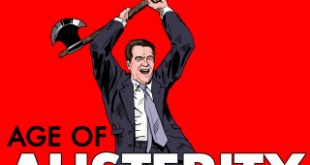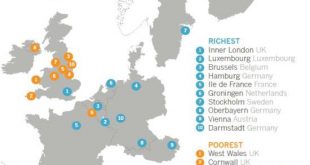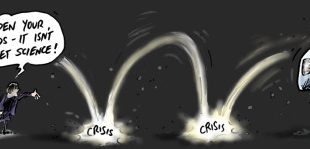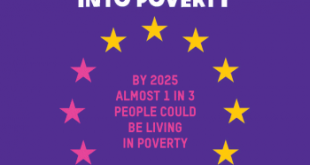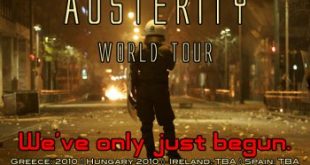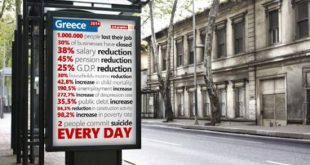Brexit shows the need for a reformed economics Brexit is about much more than frustration about the E.U. and immigration. It is about a shortage of decent and secure jobs; an impossibly precarious labour market; inexplicable inequalities in incomes and wealth; closed access to affordable education, and a terrible deficiency of affordable housing; and it is about British Chancellor of the Exchequer Osborne’s single-minded austerity economics and the...
Read More »What Brexit was all about
What Brexit was all about Societies where we allow the inequality of incomes and wealth to increase without bounds, sooner or later implode. In a market economy it is money that counts. In a democracy it is your vote that counts. If you’ve got money, you vote in. If you haven’t got money, you vote out.
Read More »Brexit — a rejection of mainstream economics
Brexit — a rejection of mainstream economics If, as a result of Brexit, the economy crashes it will not vindicate the economists, it will simply illustrate once more their failure. We, at Policy Research in Macroeconomics (PRIME) call for an urgent, independent, public inquiry into the economics profession, and its role in precipitating both the financial crisis of 2007-9, the subsequent very slow ‘recovery’; and in the British European referendum...
Read More »EU after Brexit
There will be a lot of postmortems for the European Union (EU) after Brexit. Many will suggest that this was a victory against the neoliberal policies of the European Union … The problem is that while it is true that the EU leaders have been part of the problem and have pursued the neoliberal policies within the framework of the union, sometimes with treaties like the Fiscal Compact, it is far from clear that Brexit and the possible demise of the union, if the fever spreads to...
Read More »Bad ideas never die — Greg Mankiw’s Alesina fairy tale
Bad ideas never die — Greg Mankiw’s Alesina fairy tale So what’s wrong with the economy? … A 2002 study of United States fiscal policy by the economists Olivier Blanchard and Roberto Perotti found that ‘both increases in taxes and increases in government spending have a strong negative effect on private investment spending.’ They noted that this finding is ‘difficult to reconcile with Keynesian theory.’ Consistent with this, a more recent study of...
Read More »Why Brexit won
The EU establishment has been held to account for the euro mess, for austerity policies that turned recession into depression, for the galloping inequality, and for the millions and millions of unemployed. The austerity policies pursued in the UK and elsewhere, is deeply disturbing. When an economy is already hanging on the ropes, you can’t just cut government spendings. Cutting government expenditures reduces the aggregate demand. Lower aggregate demand means lower tax...
Read More »Britain Is Finished
On the 23rd of June, Nigel Farage says we got our country back. This couldn’t be any further from the truth. The UK’s decision to leave the EU is the UK’s death knell. I don’t mean to speak in cliches, but goodbye Great Britain, and hello Little England. Every region in Scotland voted to stay in the EU. If the UK leaves, this is a direct violation of the will of Scottish voters. Scottish independence — and possibly Irish reunification, given that a majority of Northern Irish voted to stay...
Read More »Modern economics — the victory of technique over substance
Modern economics — the victory of technique over substance Modern economics is sick. Economics has increasingly become an intellectual game played for its own sake and not for its practical consequences for understanding the economic world. Economists have converted the subject into a sort of social mathematics in which analytical rigour is everything and practical relevance is nothing. To pick up a copy of The American Economic Review or The Economic...
Read More »Good Hayek vs. Bad Hayek
Good Hayek vs. Bad Hayek The source of confusion is that there was a Good Hayek and a Bad Hayek. The Good Hayek was a serious scholar who was particularly interested in the role of knowledge in the economy (and in the rest of society). Since knowledge—about technological possibilities, about citizens’ preferences, about the interconnections of these, about still more—is inevitably and thoroughly decentralized, the centralization of decisions is bound to...
Read More »The euro — gold cage of our time
The euro — gold cage of our time [embedded content] The euro has taken away the possibility for national governments to manage their economies in a meaningful way — and in Greece the people has had to pay the true costs of its concomitant misguided austerity policies. The unfolding of the Greek tragedy during the last couple of years has shown beyond any doubts that the euro is not only an economic project, but just as much a political one. What the...
Read More » Heterodox
Heterodox

